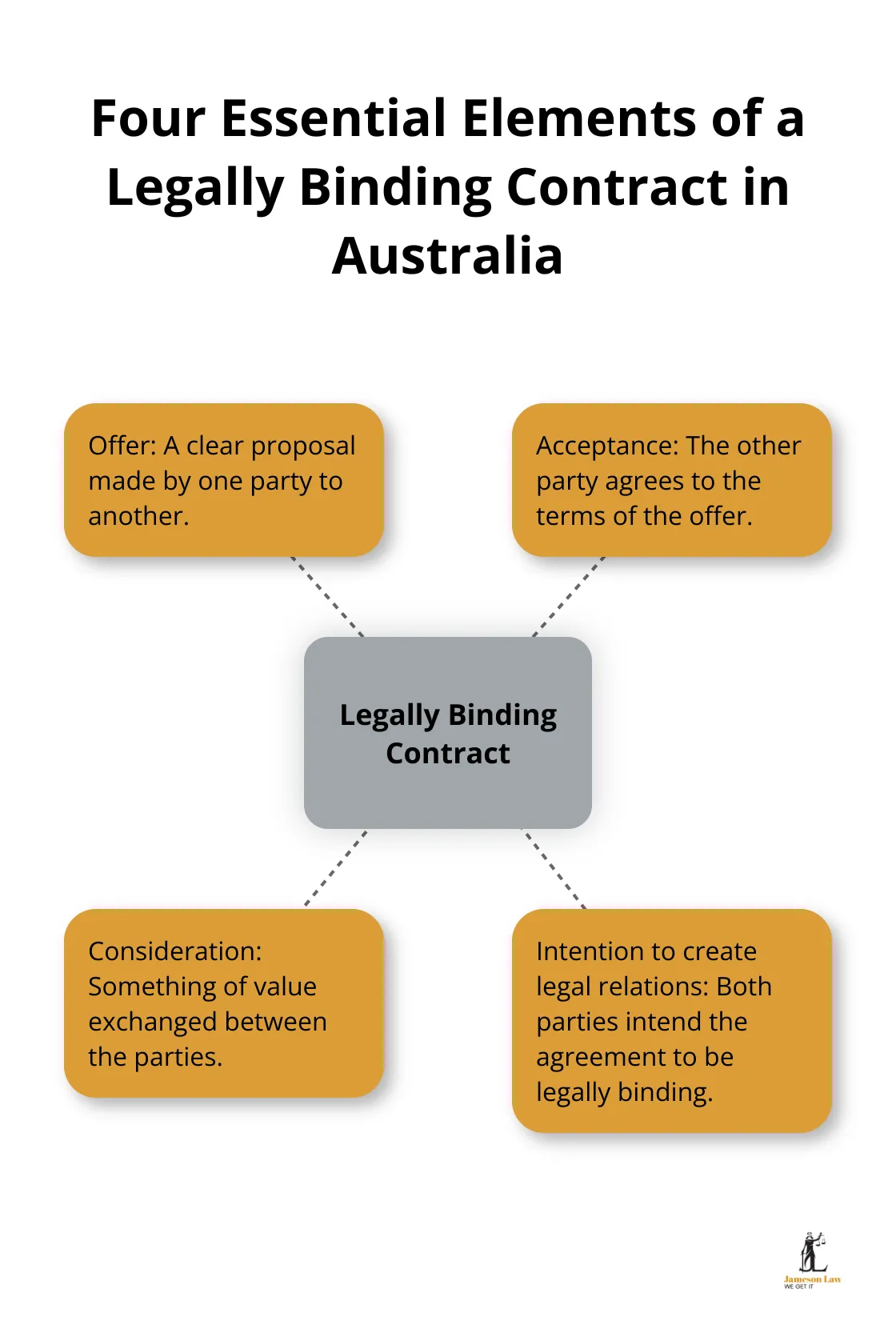Commercial law forms the backbone of modern business operations. It encompasses a wide range of legal concepts that govern commercial transactions, intellectual property, and corporate structures.
At Jameson Law, we understand the complexities of this field and its impact on businesses of all sizes. This blog post will break down key concepts in commercial law, providing you with essential knowledge to navigate the business world more effectively.
What Makes a Contract Legally Binding?
Contracts form the foundation of commercial transactions, defining business relationships and agreements. These legally enforceable promises outline the rights and obligations of the parties involved.
The Four Pillars of a Valid Contract
For a contract to be legally binding in Australia, it must contain four essential elements:

- Offer: A clear proposal made by one party to another.
- Acceptance: The other party agrees to the terms of the offer.
- Consideration: Something of value exchanged between the parties.
- Intention to create legal relations: Both parties intend the agreement to be legally binding.
Common Types of Commercial Contracts
Australian businesses encounter various types of commercial contracts:
- Supply agreements
- Distribution contracts
- Franchise agreements
- Employment contracts
- Confidentiality agreements
- Service level agreements (SLAs)
- Lease agreements
Lease agreements hold particular importance in the property sector. The total value of residential dwellings in Australia rose by $26.4 billion to $11,032.2 billion in the latest quarter, underscoring the significance of property-related contracts.
Contract Breaches and Remedies
Contract breaches occur despite best efforts. When a breach happens, the injured party may seek remedies such as:
- Damages: Compensation for losses suffered due to the breach.
- Specific performance: A court order requiring the breaching party to fulfil their contractual obligations.
- Termination: Ending the contract and potentially claiming damages.
To minimise the risk of breaches, regular contract reviews and clear communication between parties prove effective. Proactive contract management can prevent costly disputes and maintain positive business relationships.
As we move forward, it’s important to consider how corporate law shapes Australian businesses, forming a complex network of regulations that dictates how businesses operate.
How Can Businesses Protect Their Intellectual Property?
Intellectual property (IP) forms a cornerstone of business value in Australia. Protecting IP rights is essential for maintaining competitive advantage and promoting innovation. Let’s explore the key areas of IP protection for businesses.
Trade Marks: The Shield for Brand Identity
Trade marks play a vital role in brand protection. Recent data from IP Australia shows an 8% and 9% increase in trade mark applications during 2020 and 2021 respectively, indicating a growing recognition of brand value among Australian businesses.

To protect your brand effectively:
- Conduct a comprehensive search before applying for a trade mark to ensure uniqueness.
- Register your trade mark with IP Australia promptly.
- Stay vigilant for potential infringements and act quickly when necessary.
It’s important to note that trade mark protection is specific to each territory. For businesses planning international expansion, registering trade marks in other countries is advisable.
Patents: Protecting Innovations
Patents grant inventors exclusive rights to their innovations for a set period. Australia offers the option to convert an innovation patent to a standard patent application, providing flexibility for inventors.
When seeking patent protection:
- Maintain confidentiality of your invention until you file a patent application.
- File a provisional application to establish an early priority date.
- Collaborate with a patent attorney to create a comprehensive and well-drafted application.
The patent application process can be complex and time-consuming (it typically takes 2-5 years from filing to grant in Australia).
Copyright: Safeguarding Creative Works
In Australia, copyright automatically protects original works, including business content such as software code or marketing materials. While registration isn’t mandatory, it’s prudent to:
- Apply copyright notices to all your materials.
- Maintain detailed records of creation dates and processes for your works.
- Use digital rights management tools for online content protection.
Criminal penalties for wilful infringement can include fines of up to $250,000 per offence, emphasising the need for vigilance in this area.
Trade Secrets: Guarding Confidential Information
Trade secrets (such as formulas, processes, or customer lists) can provide a significant competitive advantage. To protect trade secrets:
- Implement robust confidentiality agreements with employees and partners.
- Establish clear internal policies for handling sensitive information.
- Use physical and digital security measures to restrict access to confidential data.
Effective IP management is fundamental to business success. A strong IP strategy can drive growth, protect market share, and foster innovation. As we move forward, let’s examine how different business structures and corporate governance practices impact IP protection and overall business operations in Australia.
How Business Structures Impact Corporate Governance
Sole Proprietorship and Partnerships
Sole proprietorships and partnerships represent simpler business structures but lack limited liability protection. In these structures, owners put personal assets at risk if the business faces legal issues or debt. The Australian Bureau of Statistics reports that as of June 2021, 1,425,607 sole proprietorships existed in Australia (53.6% of all businesses).
Partnerships require a carefully considered Partnership Agreement. This document should outline decision-making processes, profit-sharing arrangements, and dispute resolution mechanisms. A poorly drafted agreement can lead to significant challenges in business management.
Company Structures
Companies offer limited liability protection but involve more complex governance requirements. As of June 2021, Australia had 1,008,471 companies (37.9% of all businesses).

The proprietary limited company (Pty Ltd) stands as the most common type. These companies must have at least one director who ordinarily resides in Australia. Directors face significant legal responsibilities, including:
- Acting in good faith and in the company’s best interests
- Avoiding conflicts of interest
- Preventing insolvent trading
Failure to meet these obligations can result in severe penalties. Australia’s financial regulator investigates less than 1 per cent of tip-offs it receives about suspected corporate misconduct.
Shareholder Rights and Protections
Australian company shareholders possess several key rights:
- Voting on major company decisions
- Receiving declared dividends
- Accessing company information
The Corporations Act 2001 provides mechanisms for minority shareholders to protect their interests. Shareholders with at least 5% of the votes can call a general meeting or add items to the AGM agenda.
Companies must maintain clear communication with shareholders. Regular updates, transparent financial reporting, and well-organised annual general meetings form essential components of good corporate governance.
Governance Challenges
Many disputes arise from inadequate governance structures. Unclear decision-making processes in partnerships often lead to costly legal battles. Companies without proper shareholder agreements frequently struggle with conflict resolution.
To avoid these issues, businesses should seek professional legal advice when establishing their structure and governance processes. This upfront investment can prevent significant time and financial losses in the future.
Final Thoughts
Commercial law forms the foundation of modern business operations in Australia. Understanding its key concepts provides a strategic advantage for companies, enabling informed decisions and asset protection. Professional legal advice in commercial matters helps businesses avoid costly mistakes and seize opportunities.
Jameson Law specialises in tailored commercial law services for businesses across Australia. Our experienced lawyers offer comprehensive support in contract drafting, intellectual property protection, corporate structuring, and dispute resolution. We understand the unique challenges faced by companies in various industries.
The Australian business landscape demands companies to leverage every available tool for success. A solid grasp of commercial law (and the right legal support) can transform potential hurdles into stepping stones. Knowledgeable legal professionals empower businesses to focus on growth and innovation while handling complex legal intricacies.













